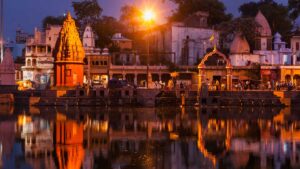Kumbh Mela stands as one of the most awe-inspiring and revered gatherings of humanity, drawing millions of pilgrims and seekers from across the globe. Rooted in ancient Indian traditions and mythology, this sacred festival holds a profound significance in Hindu culture. Let's delve into the rich history and cultural significance of Kumbh Mela, a spiritual journey that transcends time.
Origin and Mythological Roots
Ancient Vedic Texts: The origins of Kumbh Mela History can be traced back to ancient Vedic texts, where it is mentioned as a sacred gathering for spiritual enlightenment and purification.
Legend of Amrita Kalasha: According to Hindu mythology, during the epic battle between gods and demons for the nectar of immortality (Amrita), drops of the precious nectar fell at four locations: Prayagraj (Allahabad), Haridwar, Nashik, and Ujjain. These locations became the sites for the Kumbh Mela.
Historical Evolution
Historical Records: The historical records of Kumbh Mela date back to the 8th century AD, during the time of the great Hindu philosopher Adi Shankaracharya.
Patronage by Kings: Over the centuries, various rulers and emperors, such as the Mauryas, Guptas, Mughals, and Marathas, provided patronage to the Kumbh Mela, further elevating its significance.
Renowned Saints and Philosophers: Many revered saints and philosophers, including Tulsidas, Guru Nanak, Kabir, and Tukaram, have attended and contributed to the spiritual aura of the Kumbh Mela.
Cultural and Spiritual Significance
Purification and Renewal: The primary significance of Kumbh Mela lies in the belief that bathing in the holy waters of the Ganges, Yamuna, and Saraswati rivers during the auspicious planetary positions brings purification of sins and spiritual renewal.
Gathering of Saints and Sadhus: Kumbh Mela is a unique platform where thousands of saints, sadhus, and spiritual seekers from various sects and lineages gather to share knowledge, insights, and spiritual practices.
Symbol of Unity: The Kumbh Mela transcends caste, creed, and social barriers, symbolizing the unity of humanity in its pursuit of spiritual enlightenment and devotion.
Key Events and Rituals
Shahi Snan (Royal Bath): The Shahi Snan, or royal bath, is one of the most significant rituals of Kumbh Mela. During this auspicious occasion, designated dates based on astrological calculations, sadhus and pilgrims take a holy dip in the sacred rivers.
Processions and Cultural Events: The Kumbh Mela is not just a religious gathering but also a cultural extravaganza. Processions, devotional singing, spiritual discourses, and cultural performances add vibrancy to the event.
Akharas and Traditions: The various Akharas (religious orders) play a central role in the Kumbh Mela. Each Akhara has its own procession and rituals, showcasing the diverse spiritual traditions within Hinduism.
Modern-Day Kumbh Mela
World's Largest Religious Gathering: Today, the Kumbh Mela stands as the largest religious gathering on Earth, attracting millions of pilgrims, tourists, and spiritual seekers from around the world.
Recognition by UNESCO: In 2017, UNESCO recognized the Kumbh Mela as an "intangible cultural heritage of humanity," acknowledging its cultural and spiritual significance.
Infrastructure and Organization: In recent years, efforts have been made to improve infrastructure, logistics, and organization of the Kumbh Mela to accommodate the massive influx of pilgrims while ensuring their safety and comfort.
Conclusion
The history of Kumbh Mela is a tapestry woven with ancient traditions, mythological legends, and cultural significance. From its origins in Vedic texts to its evolution into the world's largest religious gathering, the Kumbh Mela continues to inspire awe and devotion among millions. It serves as a testament to the enduring spiritual quest of humanity, bringing together people from diverse backgrounds in a shared journey of faith, purification, and unity. As pilgrims gather at the sacred confluence of rivers, they partake in a timeless tradition that links the past, present, and future in a celebration of devotion and spirituality.
For more info.visit us:





Comments